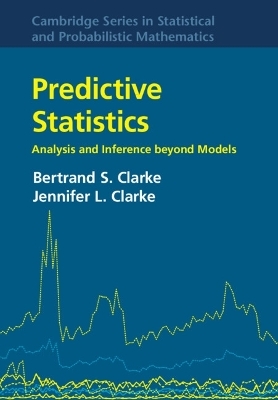
Predictive Statistics
Cambridge University Press (Verlag)
978-1-107-02828-9 (ISBN)
All scientific disciplines prize predictive success. Conventional statistical analyses, however, treat prediction as secondary, instead focusing on modeling and hence estimation, testing, and detailed physical interpretation, tackling these tasks before the predictive adequacy of a model is established. This book outlines a fully predictive approach to statistical problems based on studying predictors; the approach does not require predictors correspond to a model although this important special case is included in the general approach. Throughout, the point is to examine predictive performance before considering conventional inference. These ideas are traced through five traditional subfields of statistics, helping readers to refocus and adopt a directly predictive outlook. The book also considers prediction via contemporary 'black box' techniques and emerging data types and methodologies where conventional modeling is so difficult that good prediction is the main criterion available for evaluating the performance of a statistical method. Well-documented open-source R code in a Github repository allows readers to replicate examples and apply techniques to other investigations.
Bertrand S. Clarke is Chair of the Department of Statistics at the University of Nebraska, Lincoln. His research focuses on predictive statistics and statistical methodology in genomic data. He is a fellow of the American Statistical Association, serves as editor or associate editor for three journals, and has published numerous papers in several statistical fields as well as a book on data mining and machine learning. Jennifer Clarke is Professor of Food Science and Technology, Professor of Statistics, and Director of the Quantitative Life Sciences Initiative at the University of Nebraska, Lincoln. Her current interests include statistical methodology for metagenomics and prediction, statistical computation, and multitype data analysis. She serves on the steering committee of the Midwest Big Data Hub and is co-PI on an award from the NSF focused on data challenges in digital agriculture.
Part I. The Predictive View: 1. Why prediction?; 2. Defining a predictive paradigm; 3. What about modeling?; 4. Models and predictors: a bickering couple; Part II. Established Settings for Prediction: 5. Time series; 6. Longitudinal data; 7. Survival analysis; 8. Nonparametric methods; 9. Model selection; Part III. Contemporary Prediction: 10. Blackbox techniques; 11. Ensemble methods; 12. The future of prediction; References; Index.
| Erscheinungsdatum | 13.05.2018 |
|---|---|
| Reihe/Serie | Cambridge Series in Statistical and Probabilistic Mathematics |
| Verlagsort | Cambridge |
| Sprache | englisch |
| Maße | 180 x 259 mm |
| Gewicht | 1330 g |
| Themenwelt | Informatik ► Datenbanken ► Data Warehouse / Data Mining |
| Informatik ► Theorie / Studium ► Künstliche Intelligenz / Robotik | |
| Mathematik / Informatik ► Mathematik ► Statistik | |
| Wirtschaft ► Allgemeines / Lexika | |
| Wirtschaft ► Volkswirtschaftslehre ► Ökonometrie | |
| ISBN-10 | 1-107-02828-0 / 1107028280 |
| ISBN-13 | 978-1-107-02828-9 / 9781107028289 |
| Zustand | Neuware |
| Haben Sie eine Frage zum Produkt? |
aus dem Bereich


